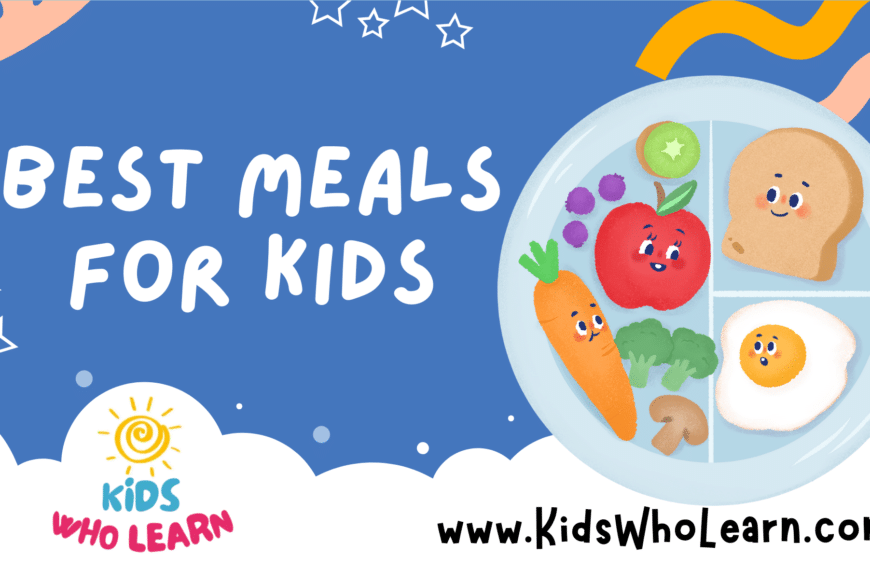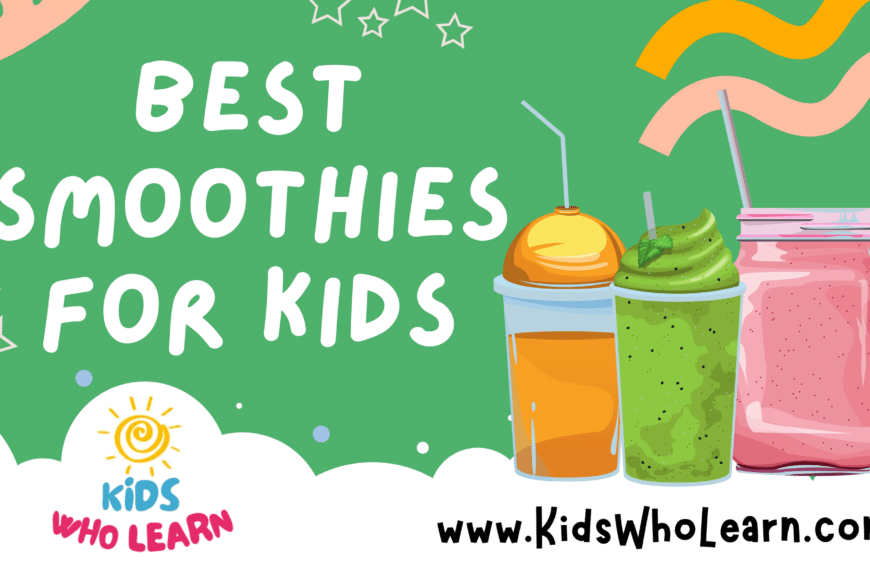Starting the day with a nutritious breakfast is crucial for kids as it provides them with the energy they need for school and play. A well-balanced morning meal can positively impact their mood and cognitive abilities, influencing their performance both inside and outside the classroom. To ensure children get the best start to their day, parents and caregivers must prioritize breakfast options that are both healthy and appealing to young palates.
It’s important to remember that the best breakfast for kids should include a mix of carbohydrates, protein, and healthy fats to sustain energy levels until lunch. Whole grains, dairy products, eggs, fruits, and vegetables offer a range of necessary nutrients that support a child’s growth and development. Additionally, making breakfast a consistent part of your family’s daily routine can instill healthy eating habits that last a lifetime.
Key Takeaways
- A nutritious breakfast enhances children’s mood and cognitive function.
- Balance carbohydrates, proteins, and fats for sustained energy.
- Establishing a routine ensures long-term healthy eating habits.
Essentials of a Healthy Breakfast for Kids
A healthy breakfast for kids should balance vital nutrients and vitamins with delicious flavors to ensure they start their day right. It’s critical to focus on whole foods that provide a range of health benefits.
Importance of Nutrients and Vitamins
Your child’s breakfast should be rich in vitamins and minerals to support growth and development. Vitamins such as Vitamin C, found in orange juice and strawberries, boost the immune system and act as antioxidants. Calcium and Vitamin D are essential for bone health, while B vitamins found in whole grains are crucial for energy production and brain health.
- Vitamins & Examples
- Vitamin C: strawberries, citrus fruits
- Vitamin D: fortified dairy or plant milk
- B vitamins: whole grain bread, fortified cereals
Balancing Proteins and Whole Grains
Protein is key for maintaining muscle mass and keeping your child satiated. Aim to include a source of protein such as eggs or yogurt. Whole grains provide fiber which aids digestion and prolongs the feeling of fullness, thus avoiding mid-morning snacking. Opt for whole grain bread, oatmeal, or whole grain cereals over refined options.
- Protein Sources
- Eggs
- Greek yogurt
- Whole Grain Choices
- Oatmeal
- Whole grain toast
Incorporating Fruits and Vegetables
Fruits and vegetables are essential for a healthy breakfast. They offer fiber, vitamins, and minerals. Berries such as strawberries are high in antioxidants, while bananas provide potassium. Vegetables can be added to an omelet or smoothie for a nutritious start.
- Fruit Ideas
- Banana slices atop cereal
- A bowl of mixed berries
- Vegetable Suggestions
- Spinach in an omelet
- Carrots in a smoothie
Avoiding Processed Sugars
Processed sugars can cause an energy crash later in the day. Aim for natural sweetness from fruits or a small amount of honey. Encourage your child to enjoy the natural flavors of food without an excess of added sugars.
- Sweetener Alternatives
- Fresh fruit
- A drizzle of honey on oatmeal
Quick and Easy Breakfast Ideas
Starting your kids’ day with a nutritious breakfast doesn’t have to be a time-consuming task. Here are efficient ways to provide them with energy and essential nutrients.
Breakfast Ideas for Busy Mornings
- Overnight oats: Combine rolled oats with milk or Greek yogurt and let them sit overnight. Top with fruits and nuts in the morning for a quick meal.
- Egg muffins: Whip eggs with vegetables and cheese, pour into muffin tins, and bake. These can be made ahead and warmed up on busy mornings.
Portable Breakfast Options
- Breakfast sandwiches: Use whole-grain English muffins, a slice of cheese, and pre-cooked eggs for a quick, on-the-go option.
- Healthy blueberry muffins: Bake a batch using whole wheat flour and Greek yogurt. Grab and go for a convenient breakfast.
Preparing Breakfast Ahead of Time
- Breakfast casserole: Assemble a casserole with eggs, bread, and veggies, refrigerate overnight, and bake in the morning.
- Make-ahead breakfast cookies: Bake cookies with oats, bananas, and nut butter. Healthy and perfect for busy mornings.
Breakfast Ideas Kids Love
- Pancakes or French toast: Make them on weekends, freeze, then reheat for a treat kids will be eager to wake up for.
- Breakfast pizza: Top flatbread with tomato sauce, scrambled eggs, and cheese. Bake until melty and delicious.
Adapting to Picky Eaters
- Yogurt with granola: Let your kids customize their parfait with their choice of yogurt flavor and granola.
- Ricotta toast: Spread ricotta on whole-grain bread and top with sliced strawberries for a simple yet tasty option.
Breakfast as an Educational Activity
- Breakfast smoothies: Let kids pick their fruits and blend with Greek yogurt or milk. They’ll learn about different ingredients and flavors.
- Build-your-own breakfast tacos: Provide various fillings and let children assemble their tacos, teaching them about food combinations.
Healthy Alternatives to Kid Favorites
- Almond bear claw donuts: Opt for almond flour and sweeten with honey or maple syrup for a healthier treat.
- Granola instead of sugary cereal: Make your own granola with oats, nuts, and a bit of honey to control sugar content.
Creative and Fun Breakfast Presentations
- Cannoli French toast roll-ups: Roll up French toast with a ricotta cheese mixture. Kids will find this twist fun to eat.
- Croissant boats: Fill mini croissants with egg and cheese, a delightful change from the usual breakfast fare.
Breakfast Foods to Avoid
- Frozen waffles or pancakes with added sugar: Look for whole-grain options without added sugars.
- Highly processed breakfast meats: Choose lean meats or plant-based proteins to accompany eggs or a slice of toast.
Special Breakfast Recipes
Creating a special breakfast for kids involves fun, nutrition, and a little creativity. Here are some recipes suited for various tastes and dietary needs to start the day off right.
Sweet and Savory Weekend Specials
Start the weekend with Fluffy Griddle Pancakes—combine whole grains for a healthy base and top with fresh fruits for a sweet touch. For a savory contrast, consider Breakfast Tacos filled with scrambled eggs, cheese, and diced vegetables.
Gluten-Free and Allergy-Sensitive Options
For kids with gluten sensitivities, try a Healthy Granola Breakfast Pie using gluten-free oats and a variety of seeds. Serve a Sweet Potato Breakfast Hash with eggs and vegetables for a protein-packed, vegetable-rich meal.
Indulgent Breakfast Treats
Indulge in a French Toast Breakfast Casserole—a crowd-pleaser that’s easy to prep ahead. Alternatively, amaze your kids with a Breakfast Sundae: layer yogurt, granola, and fruit just like a dessert, but healthier!
Cultural Breakfast Dishes
Explore the world through food with a French-inspired Breakfast Quiche or American Omelet, filled with your choice of cheese, meats, and vegetables. Both are great ways to incorporate protein and veggies in a kid-friendly form.
Celebratory Breakfast Ideas
Celebrate special occasions with a Birthday Breakfast Casserole filled with eggs, cheese, and fun add-ins like bacon or sausage. Alternatively, try a Pancake Tower, stacking pancakes with layers of fruit and whipped cream between them.
Breakfast for Lunch and Dinner
Turn traditional morning meals on their head with Chicken and Waffles, combining sweet and savory. Or serve a Breakfast Burrito with sauteed veggies and protein-rich eggs at any time for a satisfying meal.
Themed Breakfast Menus
Create a memorable meal around a theme, like a Pajama Party Breakfast with Waffle Roll-up Cakes and a Superhero Morning featuring a colorful Breakfast Parfait sporting layers themed after kids’ favorite characters.
Nutritious Beverages for Breakfast
Selecting the right beverages can boost your child’s morning nutrient intake significantly. Prioritize drinks rich in vitamins, minerals, and other beneficial compounds.
Smoothies and Shakes
Create fruit smoothies by blending your choice of fruits with Greek yogurt for a drink rich in antioxidants and protein. Utilize bananas and berries to enhance the taste and nutrient profile. For added benefits, incorporate a handful of spinach or kale to sneak in extra vitamins and minerals.
- Example Smoothie:
- 1 ripe banana
- 1/2 cup mixed berries (strawberries, blueberries)
- 1/2 cup Greek yogurt
- A handful of spinach
- 1/2 cup water or almond milk
Milk and Dairy Alternatives
Serve your kids a glass of milk or fortified dairy alternatives for a dose of calcium and vitamin D necessary for strong bones. Options like almond, soy, or oat milk are also rich in nutrients and are suitable for those avoiding dairy.
- Nutrient Comparison:
Nutrient Cow’s Milk Soy Milk Almond Milk Calcium High High* Moderate* Vitamin D High* High* Moderate* Protein High Moderate Low * when fortified
Healthy Juice Options
For juice, favor 100% fruit juice with no added sugars. An occasional small glass can contribute to their fruit intake. Orange juice is a popular choice, providing vitamin C, but remember to keep portions modest to limit sugar intake.
- Juice Tips:
- Opt for whole fruits over juice when possible.
- Limit juice to 4-6 ounces per day.
Beverages to Avoid
Advise against sugary drinks like soda, fruit punch, and sports drinks. They offer little nutritional value and can contribute to unhealthy weight gain and dental problems. Sweetened beverages are not recommended for a healthy breakfast.
- Unhealthy Options:
- Soda
- Fruit Punch
- Energy Drinks
Keep each drink simple with minimal added sugars and focus on the natural benefits of the ingredients.
Tips for Integrating Breakfast into Your Routine
Establishing a morning routine that includes a nutritious breakfast is pivotal. It can influence your children’s energy levels, attention span, and overall health. Here are strategies to make breakfast a consistent and healthy part of your kids’ day.
Making Breakfast a Family Affair
Involve your children in the breakfast process to encourage a routine. Set the breakfast table as a family the night before, and consider:
- Menu Choices: Let kids help pick healthy options.
- Preparation: Assign simple tasks for them to assist with.
Time-Saving Cooking Techniques
Quick and easy breakfasts don’t have to compromise on nutrition. Try these tips:
- Batch Cooking: Prepare portions ahead of time.
- Overnight Options: Utilize recipes like overnight oats.
Breakfast Meal Planning
Planning ahead can ensure your kids get a variety of nutrients:
- Weekly Menus: Outline what breakfast will be served each day.
- Shopping Lists: Keep essential breakfast ingredients stocked.
Educating Kids on Healthy Eating
Teach your little ones about the importance of a balanced breakfast:
- Nutrient Benefits: Discuss how proteins, vitamins, and other nutrients fuel their day.
- Food Choices: Show them how to choose healthy options.
Adjusting Breakfast for Growing Kids
As children grow, their nutritional needs change. Keep in mind:
- Portion Sizes: Increase proportions appropriately.
- Nutrient Intake: Focus on including sufficient protein and vitamins as they grow.
Understanding Breakfast Nutrition
When choosing a breakfast for kids, it’s essential to consider the balance of macronutrients, the inclusion of fiber and antioxidants, and proper hydration. These components are fundamental to kick-start their day with the right energy and nutrition.
Macronutrients in Breakfast Foods
Your kids’ breakfast should contain a balanced mix of carbohydrates, proteins, and fats. Carbohydrates provide immediate energy, proteins contribute to muscle repair and growth, and fats are vital for brain health.
- Carbohydrates: Aim for complex carbs found in whole grains rather than simple sugars.
- Proteins: Include a source like eggs or Greek yogurt to keep them feeling full.
- Fats: Opt for healthy fats such as those in avocados or nuts.
A bowl of oatmeal with strawberries and a dollop of Greek yogurt is a hearty example of a well-rounded breakfast.
The Role of Fiber and Antioxidants
Fiber is essential for a healthy digestive system, and it helps keep your child satiated. Antioxidants protect your child’s cells from damage and support immune health.
- Fiber: Choose high-fiber foods like whole grain bread or fruits.
- Antioxidants: Berries, like strawberries, are rich in antioxidants and add a sweet taste to any breakfast.
Incorporating a mix of whole grains and berries into your child’s breakfast can provide both fiber and antioxidants.
The Importance of Hydration
Starting the day with a glass of water rehydrates your child’s body and is as vital as the meal itself.
- Encourage your child to drink water, or include hydrating foods like yogurt and fruit.
- Avoid sugary drinks, which can lead to a quick spike and fall in energy.
Hydration is important, so ensure water intake is a part of the breakfast routine.
Resources and Recommendations
When preparing the best breakfast for your kids, resources are key. You need the right information and quality ingredients to create a nourishing start to their day.
Selecting Quality Ingredients
Fresh Produce: Local farmers’ markets offer fresh fruits and vegetables. Prioritize organic when possible to reduce exposure to pesticides.
Whole Grains: Choose whole-grain bread and cereals that list whole grains as the first ingredient.
Lean Proteins: Eggs, lean meats, and plant-based proteins should have minimal processing. Look for labels such as “grass-fed” or “free-range.”
Cookbooks and Culinary Guides
The School Year Survival Cookbook: Ideal for quick and healthy breakfast options.
Real Food for Mother and Baby: Focuses on nutrition from pregnancy to preschoolers. Utilize the recipes for wholesome family breakfasts.
Online Communities and Blogs
Weelicious: A blog with kid-friendly breakfast recipes that are both healthy and easy to make.
Mom’s Kitchen Handbook: Offers advice on meal planning and includes nutritious breakfast ideas that cater to kids.
Conclusion
Your choices in breakfast foods for kids can set the tone for their energy levels, mood, and cognitive abilities throughout the day. It’s essential to focus on nutrient-dense options that provide sustained energy and do not spike blood sugar levels.
Balanced Breakfast:
- Proteins: Eggs, Greek yogurt, or nut butters.
- Whole Grains: Oatmeal, whole-grain breads, or cereals.
- Fruits: Berries, bananas, or apple slices.
- Vegetables: Spinach in omelets or avocado as a side.
Remember to adjust portions according to your child’s age, activity level, and nutritional needs. Involving kids in the preparation can encourage them to try new foods and understand the importance of a healthy breakfast.
Making informed choices about your child’s first meal can make a significant difference in their daily life and contribute to healthier eating habits.
Frequently Asked Questions
Choosing the right breakfast can fuel children’s minds and bodies for the busy day ahead. In this section, you’ll find answers to common questions about crafting a healthy and appealing morning meal for kids of various ages.
What constitutes a balanced breakfast for children?
A balanced breakfast for your child includes a mix of carbohydrates, protein, and fiber. Whole-grain cereals, milk or yogurt, and fruits are great choices to meet these nutritional needs.
Which foods are considered healthy breakfast options for a 10-year-old?
For a 10-year-old, healthy breakfast options can include oatmeal topped with nuts and berries, scrambled eggs with whole-grain toast, or a smoothie made with Greek yogurt, fruits, and spinach.
Can you suggest easy breakfast ideas that an 11-year-old can prepare themselves?
An 11-year-old can prepare simple breakfasts like a bowl of whole-grain cereal with milk, a peanut butter and banana sandwich, or yogurt with granola and fruit. These are nutritious and quick to make.
What are suitable breakfast choices for toddlers who are picky eaters?
For picky toddlers, try offering small portions of various foods. Whole-grain pancakes with a fun shape, cottage cheese with fruit, or scrambled eggs with avocado can be appealing and nutritious.
How can a breakfast menu be tailored to support a child’s weight management?
To support weight management, focus on breakfasts that are high in fiber and protein but low in added sugars. Opt for oatmeal with a handful of nuts, a boiled egg with whole-wheat toast, or a fruit smoothie with chia seeds.
What are some family-friendly breakfast ideas that cater to different age groups?
Family-friendly breakfast ideas include a build-your-own oatmeal bar with various toppings, a breakfast burrito station with assorted fillings, or a yogurt parfait assembly line. These options cater to different preferences and age groups.












